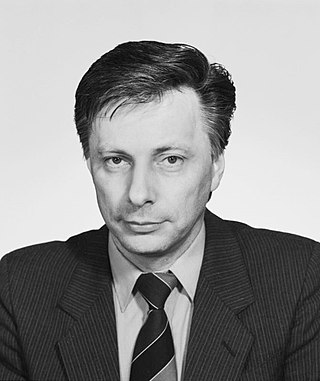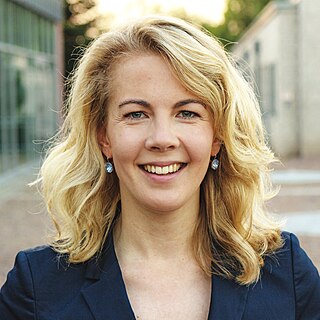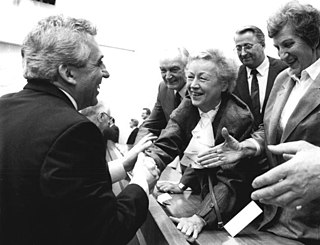Related Research Articles

The Ministry for State Security, commonly known as the Stasi, an abbreviation of Staatssicherheit, was the state security service of East Germany from 1950 to 1990.

The Liberal Democratic Party of Germany was a political party in East Germany. Like the other allied bloc parties of the Socialist Unity Party of Germany (SED) in the National Front, it had 52 representatives in the People's Chamber.

Manfred Gerlach was a German jurist and politician, and the longtime leader of the East German Liberal Democratic Party. He served as Chairman of the Council of State and was thus head of state of East Germany from 6 December 1989 to 5 April 1990.
The German Democratic Republic was created as a socialist republic on 7 October 1949 and began to institute a government based on the government of the Soviet Union during the Stalin era. The equivalent of the Communist Party in East Germany was the Sozialistische Einheitspartei Deutschlands, which along with other parties, was part of the National Front of Democratic Germany. It was created in 1946 through the merger of the Communist Party of Germany (KPD) and the Social Democratic Party of Germany (SPD) in the Soviet Occupation Zone of Germany. Following German reunification, the SED was renamed the Party of Democratic Socialism (PDS), which eventually merged with the West German Electoral Alternative for Labor and Social Justice to form the modern Left Party.
The Council of Ministers was the cabinet and executive branch of the German Democratic Republic from November 1950 until the country was reunified on 3 October 1990. Originally formed as a body of 18 members, by 1989 the council consisted of 44 members.

The Social Democratic Party in the GDR was a reconstituted Social Democratic Party existing during the final phase of East Germany. Slightly less than a year after its creation it merged with its West German counterpart ahead of German reunification.

General elections were held in East Germany on 18 March 1990. They were the first free elections in that part of Germany since 1932, and were the first and only free elections held in the state before German reunification. The Alliance for Germany, led by the new East German branch of the centre-right Christian Democratic Union (CDU), won 192 seats and emerged as the largest bloc in the 400-seat Volkskammer, having run on a platform of speedy reunification with West Germany. The East German branch of the Social Democratic Party (SPD), which had been forced to merge with the Communist Party of Germany (KPD) in 1946 and refounded only six months before the elections, finished second with 88 seats despite being widely expected to win. The former Socialist Unity Party of Germany, restyled as the Party of Democratic Socialism (PDS), finished third with 66 seats.

Kurt Wünsche was a German politician who was twice Minister of Justice of the German Democratic Republic.

Rainer Ortleb is a German academic and politician.

Jürgen Schmieder is a politician, originally from East Germany, who came to prominence during the months immediately preceding German reunification.

Günter Stempel was a German politician (LDPD). He was involved in the formation of the German Democratic Republic (GDR), despite which he was a victim of political repression in both the GDR and the USSR.

Stefan Wolle is a German historian. A focus of his socio-historical research is on the German Democratic Republic which is where, before reunification, he lived and worked.

Linda Teuteberg is a German lawyer and politician of the Free Democratic Party (FDP). Serving as a member of the Bundestag since 2017, she was elected as General Secretary of the FDP on 26 April 2019 and thereby became part of the party's leadership around chairman Christian Lindner. Lindner asked for and received her resignation effective 19 September 2020.

Hero of the German Democratic Republic (GDR) was an honorific title awarded by the former East German state, accompanied by a certificate and medal. The title was instituted by the politburo of the Socialist Unity Party on 29 October 1975 as the most prestigious award of the GDR and first awarded on 28 November 1975. In total, it was awarded on 17 occasions to 11 recipients.

Eberhard Aurich is a former German politician and high-ranking functionary of the Free German Youth (FDJ).

Klaus Sorgenicht was a German politician and party functionary of the Socialist Unity Party (SED).

Walter Halbritter was a German civil servant, politician and party functionary of the Socialist Unity Party (SED).

Hans Albrecht was a German politician and high-ranking party functionary of the Socialist Unity Party (SED).
Gerhard Baumgärtel was a German architect, university lecturer and politician of the East German Christian Democratic Union (CDU).

Hans-Joachim Heusinger was a German politician and party functionary of the Liberal Democratic Party of Germany (LDPD).
References
- 1 2 3 4 5 6 7 8 9 10 11 12 "Viehweger, Axel". www.bundesstiftung-aufarbeitung.de (in German). Federal Foundation for the Reappraisal of the SED Dictatorship. 2009. Retrieved 2024-05-11.
- 1 2 3 4 5 6 7 8 9 10 11 12 13 14 15 16 17 "Ministerbiografie". Deutsche Einheit 1990 (in German). Federal Foundation for the Reappraisal of the SED Dictatorship . Retrieved 2024-05-11.
- 1 2 3 4 5 6 7 8 9 10 11 12 Graupner, Michael (2018-03-13). "Axel Viehweger - Minister für Bauwesen, Städtebau und Wohnungswirtschaft". www.mdr.de. DIE LETZTE DDR-REGIERUNG (in German). Mitteldeutscher Rundfunk . Retrieved 2024-05-11.
- 1 2 3 Behn, Beatrice; Wiesner, Maria (2019-11-06). "Der letzte DDR-Bauminister Axel Viehweger im Gespräch". FAZ.NET (in German). Frankfurter Allgemeine Zeitung . Retrieved 2024-05-11.
- ↑ "Foto "Kabinett de Maizière"". www.hdg.de (in German). Stiftung Deutsches Historisches Museum, Stiftung Haus der Geschichte der Bundesrepublik. Retrieved 2024-05-11.
- ↑ Fritsch, Barbara, ed. (2013). "Bereich Minister". www.argus.bstu.bundesarchiv.de (in German). German Federal Archives . Retrieved 2024-05-11.
- 1 2 3 "Ministerium für Bauwesen, Städtebau und Wohnungswirtschaft". Deutsche Einheit 1990 (in German). Federal Foundation for the Reappraisal of the SED Dictatorship . Retrieved 2024-05-11.
- ↑ "Lizenz zum Gelddrucken". Der Spiegel (in German). 1991-06-30. ISSN 2195-1349 . Retrieved 2024-05-11.
- 1 2 3 Bornhöft, Petra (1990-11-26). "Der Stasi-Fall Viehweger und die FDP-Legenden". Die Tageszeitung (in German). p. 5. ISSN 0931-9085 . Retrieved 2024-05-11.
- ↑ Pries, Dorit (2008). Stasi-Mitarbeiter in deutschen Parlamenten? die Überprüfung der Abgeordneten auf eine Zusammenarbeit mit dem Staatssicherheitsdienst der ehemaligen DDR. Juristische Schriftenreihe (in German) (1. Aufl ed.). Berlin Münster: LIT-Verl. p. 52. ISBN 978-3-8258-0593-7.
- ↑ "Spuren im Schnee". Der Spiegel (in German). 1991-11-24. ISSN 2195-1349 . Retrieved 2024-05-11.
- ↑ "20. Delegiertenversammlung wählt Dr. Axel Viehweger und Dietmar Haßler in den Vorstand". Volkssolidarität Dresden (in German). 2019-09-18. Retrieved 2024-05-11.